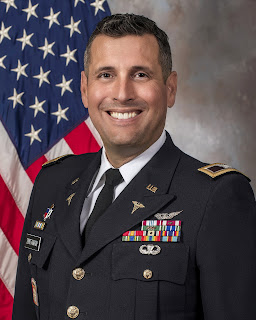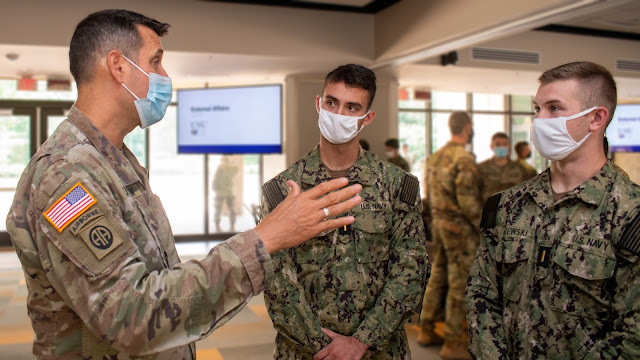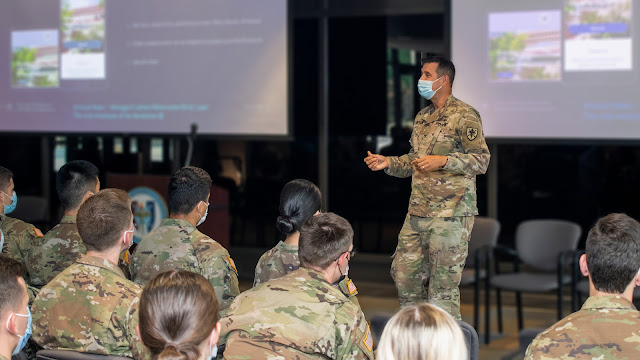Nearly Two Decades Later, USU Alumnus Returns as Student Military Leader
By Sharon Holland
 |
| Army Col. (Dr.) Jay Dintaman, USU Class of 2003, has returned to campus as the new School of Medicine Commandant. (Photo by Tom Balfour, USU) |
Dintaman, who graduated from USU in 2003, is the newly-appointed Commandant of students for the School of Medicine. He is responsible for the military day-to-day aspects of the nearly 800 medical students, uniformed graduate students, and Enlisted to Medical Degree Preparatory Program students at USU, a task he is well qualified for and excited to begin.
“As a USU School of Medicine alumnus and lifelong Army physician,” Dintaman says, “I know firsthand the unique value that USU brings to the Military Health System and I wanted an opportunity to contribute to that mission. I’m looking forward to connecting and interacting with the students and hopefully providing leadership and mentorship that will help them as they progress through medical school and begin their careers in military medicine.”
Dintaman says there have been a lot of changes since he walked the halls in the early 2000s, including the way classes are now taught, and what students are learning.
“The biggest change has been the curriculum which has moved to a systems-based approach with an increased emphasis on clinical teaching and hands-on encounters for the students,” he adds. “In addition, the military medicine curriculum has also expanded in scope to be much more realistic and ambitious, which is appropriate given our mission.USU is one of the premier medical education institutions in the country and the growth and evolution of its faculty and curriculum are a reflection of an adaptability that is vital for continued success.”
And although Dintaman sees a lot of change, he also recognizes that some aspects of the University are very much the same as they were back in 1999 through 2003.
“It’s fantastic to be back on campus and experience the facilities and wonderful staff who, in many cases, were here when I was a student. The exceptional support for the student body has remained constant over the years; no other institution backs their student body to the degree seen at USU. That includes the dedication seen from the faculty, the outstanding facilities, and the world-class staff who keep everything running.”
Dintaman, who began his new job only a couple of months ago, is starting out in his role alongside a new class of students.
“I hope that current and future students will learn of the value in embracing the unknown when it comes to their medical careers,” he offers. “There is no right way to be a military physician and my personal experience has been that the most rewarding opportunities were those that were unexpected and where I found myself outside of my comfort zone. That experience can be scary and sometimes frustrating, but in the end can end up paying the biggest dividends in terms of personal and professional growth and development.”
Dintaman, a native of Washington, DC, graduated from the University of Delaware in 1996, with a degree in biochemistry. Following his graduation from medical school at USU in 2003, he completed a pediatrics residency, followed by a neonatal-perinatal fellowship with the National Capital Consortium at Walter Reed National Military Medical Center. In addition to assignments as staff neonatologist and later, chief of Neonatology at Madigan Army Medical Center in Tacoma, Wash., Dintaman also served as a flight surgeon for the 2-2 Aviation Battalion in Seoul, Korea, and as the command surgeon for the Warrior Transition Brigade-National Capital Region in Bethesda, giving him both clinical and operational experience. His most recent assignment was chief of Medical Readiness in the Office of the Surgeon General where he provided strategic medical readiness policy development and expertise on behalf of the Army Surgeon General. He is also a clinical researcher, whose interests include measuring quality care in newborn medicine within the military medical community and studying the Warrior Care and Transition Program to further define its population and document program outcomes.
“I don’t believe that any one aspect of my background is more important than any other,” Dintaman concludes. “One of my most important goals is that the student body see me as an example for what they can potentially achieve if they wish. Not specifically that they follow in my footsteps or make O-6, but rather, that they recognize that whether they see themselves as a clinician, researcher, operator, or a leader (and they all are), that there is a home for them within the Military Health System.”






